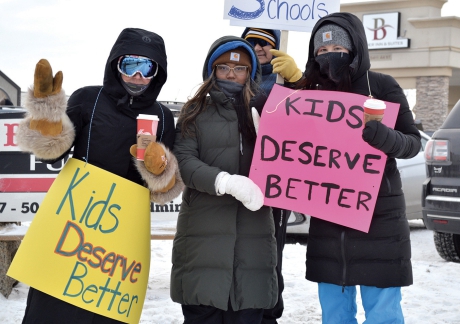Reports
You are here
Saskatchewan Teachers take job actions to save public education

February 12, 2024
The Saskatchewan Teachers’ Federation (STF) has been seeking long term solutions to the cuts to education for at least the last ten years.
The STF is demanding better funding for education, smaller classroom sizes, more support for students with complex needs and better support for teachers in dealing with the multitude of increasing duties.
Recent anti-trans, anti-LGBTQ+ legislation forces teachers to notify parents if their students want to be identified by other pronouns, reducing trust between teachers and students. Samantha Becotte, STF's president wants to rectify this through bargaining.
Now teachers can be teaching in classroom sizes that are 30-50 students with usually at least 2 complex needs students. The optimal classroom size is 25 students with no complex needs. One teacher said she had to hold one student on her lap to keep him calm while teaching reading to the rest of her students. A music teacher posted that in 2006 he had $15,000 for a music program for 190 students but now he only has $700 for 145 students.
Drastic funding cuts force schools to function by organising numerous fundraising events to continue as best as can.
Becotte stated the STF wants long term solutions, not band aid approaches that let the government take away funding as it sees fit. The STF wants funding mandated in the Collective Agreement so education can move forward. Their opening proposal is to get decent classroom sizes, more support for students with complex needs and teachers' salaries tied to CPI (Consumer Pricing Index) inflation measure, the pay scale that members of the Provincial Legislature gave themselves
Last April, after pushback from the teachers, educational support staff organized under CUPE and the public, the Provincial government was forced to put $40 million back into education.
Jeremy Cockrill, Minister of Education says he will not bargain with the teachers over conditions, only wages. They also only want to increase teachers’ salaries by 7% over 3 years with no inflationary increase. Inflation rises in the past few years outstrip that figure and ammount to a big pay cut in real terms.
The government just ignores the problems in education with students having complex needs. Michelle Kramer, a mother of a second year student with autism illustrates the problem. First she is a single parent that needs to get her son tested. There is a 7300 students (under the age of 18) waiting list for the tests. He is in the classroom with no support and creates problems so she is often called to pick him up. This has resulted in her having to work part-time and face more financial problems. Without the confirmation from the test, she and the school are not eligible for any extra help in the classroom.
Kramer supports the teachers totally and wants to see better mechanisms in place to support her son, and others with special needs. The government states it has $20 million for support for schools to help students who need it. However, without government changes, access is very difficult.
The teachers have not given up. They had 2 provincial-wide two day strikes. They also are doing rotating strikes. Recently, it was the Moose Jaw, Prince Albert, Humboldt and Melfort areas that shut down. They plan to stop supervision of lunchtime or extracurricular activities in the Saskatoon and Northern part of the province. The school divisions have already decided to cancel the afternoon classes. This will affect 65,000 students.
The public has shown support by joining the picket lines and sending texts to the government on “Tell Them Tuesday"events. Cockrill is now responding to media interviews where before he just sent statements that he couldn’t get involved in the labour dispute, and all issues of classroom sizes and resources for complex needs were the jurisdiction of the local Boards of Education.
The two sides are a long way from coming up with an agreement. After a decade of funding cuts and decisions to privatize education via more funding for often unregulated religious schools, teachers and parents are in the fight for the long haul. They have shown determination to win better conditions for kids and better working conditions for themselves – the two things are connected. Public Education in Saskatchewan is at stake.
Section:
Topics:









